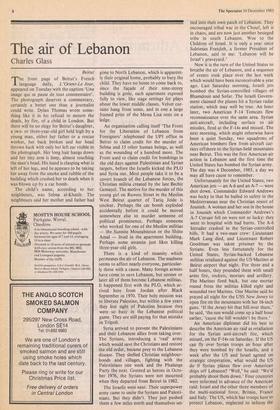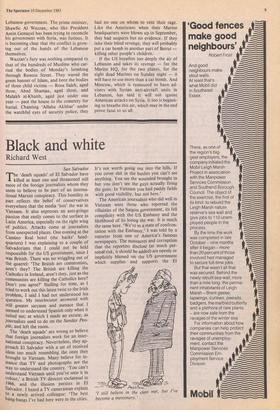The air of Lebanon
Charles Glass
Beirut The front page of Beirut's French language daily, L'Orient-Le Jour, appeared on Tuesday with the caption 'line image qui se passe de tout commentaire'. The photograph deserves a commentary, certainly a better one than a journalist could write. Dylan Thomas wrote some- thing like it in his refusal to mourn the death, by fire, of a child in London. But there will be no elegy for Beirut's daughter, a two- or three-year-old girl held high by a young man, either her father or a rescue worker, her back broken and her head thrown back with only her left ear visible in the photograph. Her long hair hangs down and her tiny arm is limp, almost touching the man's head. His hand is clasping what is left of her legs, and he appears to be taking her away from the smoke and rubble of the building which crushed her to death when it was'blown up by a car bomb.
The child's name, according to her neighbours, was Selma al-Khatib. The neighbours said her mother and father had
gone to North Lebanon, which is apparent- ly their original home, probably to bury the child. They have no home to come back to, since the façade of their nine-storey building is gone, each apartment exposed fully to view, like stage settings for plays about the lower middle classes. Velvet cur- tains hang from some, and in one a large framed print of the Mona Lisa rests on a ledge.
An organisation calling itself 'The Front for the Liberation of Lebanon from Foreigners' telephoned the UPI office in Beirut to claim credit for the murder of Selma and 15 other human beings, as well as the wounding of a hundred more. The Front used to claim credit for bombings in the old days against Palestinian and Syrian targets, before the Israelis kicked the PLO and Syria out. Most people take it to be a covert branch of the Lebanese forces, the Christian militia created by the late Bechir Gemayel. The motive for the murder of this young girl on Ruwess Street in the Muslim West Beirut quarter of Tariq Jeide is unclear. Perhaps the car bomb exploded accidentally before it could be moved somewhere else to murder someone of political prominence. Perhaps someone who worked for one of the Muslim militias — the Sunnite Mourabitoun or the Shiite Amal — lived in the apartment building. Perhaps some assassin just likes killing three-year-old girls.
There is a kind of insanity which permeates the air of Lebanon. The madness seems to affect nearly everyone, particular- ly those with a cause. Many foreign armies have come to save Lebanon, but sooner or later all of them become Lebanese militias. It happened first with the PLO, which ar- rived here from Jordan after Black September in 1970. Their holy mission was to liberate Palestine, but within a few years they lost sight of Palestine because they were so busy in the Lebanese political game. They are still paying for that mistake in Tripoli.
Syria arrived to prevent the Palestinians and their Lebanese allies from taking over. The Syrians, introducing a 'real' army which would save the Christians and restore the old order, became prey to the Lebanese disease. They shelled Christian neighbour- hoods and villages, fighting with the Palestinians one week and the Phalange Party the next. Greeted as heroes in Octo- ber 1976, the Syrians were not mourned when they departed from Beirut in 1982.
The Israelis were next. Their superpower army came to smite the Syrians and Palesti- nians. But they didn't. They just pushed them a few miles north and themselves set-
tled into their own patch of Lebanon. They encouraged tribal war in the Chouf, left it in chaos, and are now just another besieged tribe in south Lebanon. Woe to the Children of Israel. It is only a year since Suleiman Franjieh, a former President of Lebanon, said to me: `Lebanon will be Israel's graveyard.'
Now it is the turn of the United States to breathe the air of Lebanon, and a sequence of events took place over the last week which would have been inconceivable a year ago. Last Saturday morning, Israeli jets bombed the Syrian-controlled villages of Bhamdoun and Sofar. The Israeli Govern- ment claimed the planes hit a Syrian radar station, which may well be true. An hour later, two American F-14 Tomcats flew reconnaissance over the same area. Syrian anti-aircraft, including surface to air missiles, fired at the F-14s and missed. The next morning, which might otherwise have been a quiet Sunday, two squadrons of American bombers flew from aircraft car- riers offshore to the Syrian-held mountains near Beirut. This was the first American air action in Lebanon and the first time the United States has bombed the Syrian army. The day was 4 December, 1983, a day we may all have cause to remember.
Unfortunately for the United States, two American jets — an A-6 and an A-7 — were shot down. Commander Edward Andrews was lucky in that he bailed to safety in the Mediterranean near the Christian resort of Jounieh. A woman and her son in the house in Jounieh which Commander Andrews's A-7 Corsair fell on were not so lucky: they went to hospital with bad burns. The A-6 Intruder crashed in the Syrian-controlled hills. It had a two-man crew: Lieutenant Mark Lang died, and Lieutenant Robert Goodman was taken prisoner by the Syrians. Even less fortunately for the United States, Syrian-backed Lebanese militias retaliated against the US Marines at Beirut airport that night. For three and a half hours, they pounded them with small arms fire, rockets, mortars and artillery. The Marines fired back, but one mortar round from the militias killed eight and wounded two Marines. One Marine said he prayed all night for the USS New Jersey to open fire on the mountains with her 16-inch guns. `If the Jersey hit that hill over there,' he said, 'the sun would come up a half hour earlier, 'cause the hill wouldn't be there.'
An American diplomat did his best to describe the American air raid as retaliation for the Syrian anti-aircraft fire, which missed, on the F-14s on Saturday. If the US can fly over Syrian troops an hour after they were bombed by the Israelis, and a week after the US and Israel agreed on strategic cooperation, what would the US do if Syrian planes flew over American ships off Lebanon? 'Well,' he said. 'We'd probably shoot them down.' Four countries were informed in advance of the American raid: Israel and the other three members of the multi-national force, Britain, France and Italy. The US, which has troops here to protect Lebanon, neglected to inform the
Lebanese government. The prime minister, Shawfic Al Wazzan, who like President Amin Gemayel has been trying to reconcile his government with Syria, was furious. It is becoming clear that the conflict is grow- ing out of the hands of the Lebanese themselves.
Wazzan's fury was nothing compared to that of the hundreds of Muslims who car- ried the bodies of Monday's bombing through Ruwess Street. They waved the green banner of Islam, and bore the bodies of three child victims — Rosa Saleh, aged three, Abed Shamaa, aged three, and Malakh al-Khatib, aged just under one year — past the house to the cemetery for burial. Chanting 'Allahu Akhbar' under the watchful eyes of security police, they
had no one on whom to vent their rage. Like the Americans when their Marine headquarters were blown up in September, they had suspects but no evidence. If they take their blind revenge, they will probably put a car bomb in another part of Beirut — killing other people's children.
If the US breathes too deeply the air of Lebanon and takes its revenge — for the Marine HQ, for the two planes, for the eight dead Marines on Sunday night — it will have to use more than a car bomb. And Moscow, which is rumoured to have ad- visers with Syrian anti-aircraft units in Lebanon, has said it will not ignore American attacks on Syria. It too is beginn- ing to breathe this air, which may in the end prove fatal to us all.















































 Previous page
Previous page